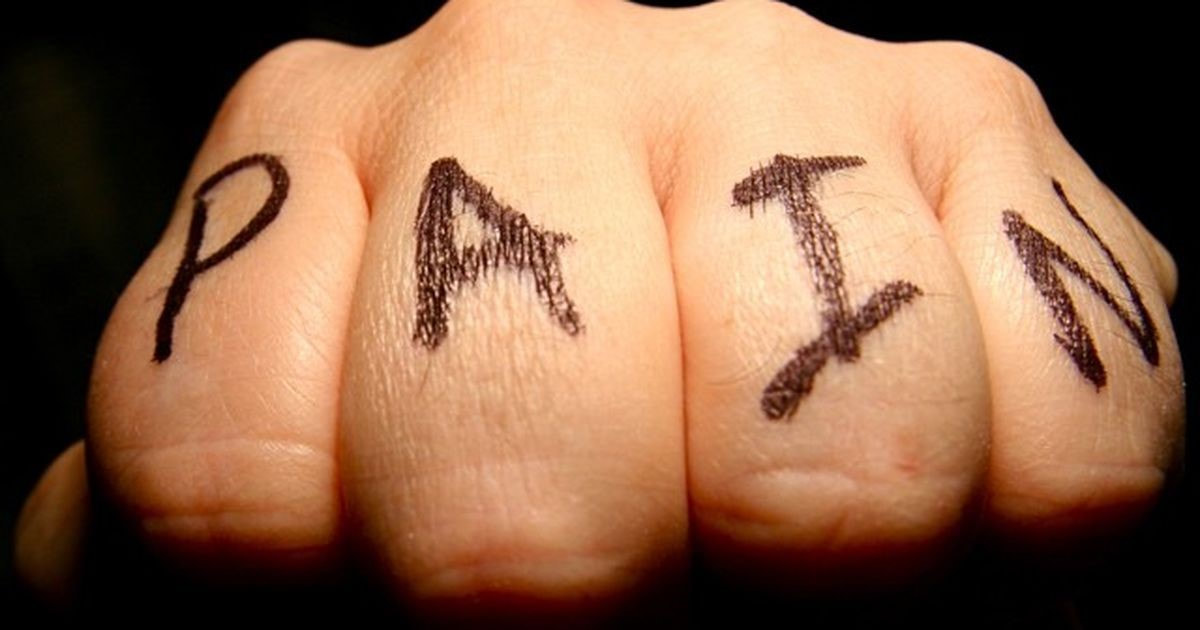 Refusal to acknowledge and express pain as a sign of masculinity is a deep-rooted conditioning towards sexual hierarchy Refusal to acknowledge and express pain as a sign of masculinity is a deep-rooted conditioning towards sexual hierarchy Exactly a year and a half back, we were wheeling in our son into the emergency OPD for a bone-deep gash he suffered on his forehead. While I noticed that he was as cool as a cucumber except a few sporadic oohs and ouches, the neighboring pediatric ward was resonating with heart-wrenching cries of a toddler being needled with a vaccine booster dose! From an “Ouch!” to “Oh my God”, pain has made you remember your mother and, your belief in the almighty stronger, atleast a few times by now. For one it could just be a stubbed toe to bring the roof down while for another, only after 20 broken bones will you hear a yelp. Ofcourse there is always an intrinsic personality of individuals that make them perceptive and reactive to pain in contrasting ways, but could a scientific possibility be ruled out? That wriggly curious worm inside didn’t let me rest in peace till I could fill the blanks up. We all have the same pain receptors (nociceptors-in technical terms), the same neurosensory pathway, the same nerve endings and the same god-damn cerebral cortex, yet we differ in our response to pain. Why? Pain is the Protector! Pain is extremely important. Yes, you heard it right. Pain is uncomfortable but it is the foremost signal given to the body that it needs protection and healing. If you lose sensation to pain, you are at a greater risk of losing your life. Don’t confuse threshold with tolerance Pain Threshold and Pain Tolerance are two completely different things. When I say I don’t feel much pain if I accidently hurt my thumb while chopping vegetables, I have a high threshold to pain: which means I start perceiving pain as a discomfort only at a higher intensity. So I need my whole thumb to be chopped off my palms to finally bawl out in pain! At the same time, I can perhaps feel immense pain with a severed thumb yet can bear it till the cows come home! That would define my tolerance to pain. The diversity in phrasing these two aspects of pain determines the response to it. To simplify this, “it doesn’t pain that much” tells about your threshold to sense pain; and “it is paining but I can manage” tells about your tolerance to pain. “I cannot explain how much that pains!”
“Come on, be brave!”
Your psychological state has a direct impact on your perception of pain. The knee doesn’t hurt as much as your heart does. And all those baffled hormones and neurotransmitters are making your more vulnerable and less tolerant to even a pink prick. “I ran the marathon despite a bad Achilles heal!”
Not that they are born with nociceptors with super-human power, but because they develop the tolerance with will power and consistent endurance exercises. Exercise is known to manipulate the neuroendocrine system, making it, if I can say, tougher and resilient. Another reason to get those limbs moving and muscles screaming! “Boys don’t cry!”
While one school of thought swears by the tremendous pain-tolerance capacity of women owing to their intrinsic child-bearing attribute, others do not accept any refutation to men being the stronger ones. Going by biology, I will have to very reluctantly admit (my double X is not liking this admission!)) that women do have slightly lower tolerance and threshold to pain because of less natural painkillers like endogenous opioids and circulating beta endorphins. Women are what their hormones tell them. Their sensitivity to pain varies across their menstrual cycle and unfortunately women are more likely to suffer from chronic pains later in life than men do. Sounds outraging but it makes sense. Nevertheless, that doesn’t necessarily make men more tolerant. (I admit once again that I have a strong feminist streak!). There is a deep rooted conditioning that men are subjected to as young as toddlers and boys of basically braving every onslaught without any hint of expressed pain and sadness. (But then, aggression is allowed! Rather expected!). This psychosocial conditioning is a major reason why boys grow up into men who take risks, brush off injuries and say “I am fine” more often than women! When Tolerance Turns Toxic… Extreme threshold and tolerance to pain is not a gift of god everytime! It can be a huge deterrent to your health and wellbeing. Not allowing your body to feel pain in its natural acuity and chronicity can confuse your body’s fundamental healing process.
Pain can make you and break you too. But to brave the pain, we need to feel the pain first. It is undoubtedly a blessing to be able to bear pain and yet come out victorious, physically or emotionally. Nevertheless, sensitivity to pain can be modulated. If you fall on the lower side of the scale, there are more than enough ways to increase your threshold and tolerance. But if you are on the other side of spectrum, you have some task to do before you are faced with a bigger monster! 10/24/2018 02:47:24 am
Pain is important for the body. Pain is uncomfortable. It is the signal given to the body that needs protection and healing. Good article. Kindly know <a rel="dofollow" href="http://www.ferty9.com/">best infertility specialist in hyderabad</a> Comments are closed.
|
AVOID FRAUD. EAT SMART.AuthorDietitian & Nutritionist Dr. Nafeesa Imteyaz. ArchivesCategories |
- Home
- Written Testimonials
- Consult
- Clinics
- Blogs
-
Diet & Nutrition
- Diabetes Reversal
- IVF IUI not needed for PCOS PCOD Infertility
-
Medical Nutrition
>
-
Disease & Conditions
>
- Infertility | PCOS
- Diabetes Mellitus
- Cholesterol
- Hypothyroid
- Kidney Problems
- Hypertension
- Cardiovascular Diseases
- Liver Diseases
- Gastro intestinal disorder
- Cancer
- Metabolic Disorders
- Orthopedic Disorders
- Eating Disorders
- Dietary Recall
- Weight Record Filled By Clients
- Online Payment Transaction Details
- Online Clients Weight Check Form
- Our Program Package Service Charges
- Weight Record 2017 Clients
- Measurements sent by Clients
- Terms & Conditions Of Payment
- Thanks. Your Form is Submitted
- Video Testimonials
- Lifestyle & Wellness
- Lifestyle & Wellness Blog
- Allergy & Intolerance
- Weight Loss / Gain
- Weight Loss / Slimming Blog
-
Disease & Conditions
>
- Life Cycle Nutrition >
- Sports Nutrition >
- Integrity in Nutrition
- Knowledge Centre
© COPYRIGHT 2022. ALL RIGHTS RESERVED. FRST HEALTHCARE PVT LTD.
Dr. Nafeesa Imteyaz of First Eat Right clinic, is the Best Dietitian Nutritionist in Bangalore. Best Dietitian Nutritionist in Pune. Best Dietitian Nutritionist in Hyderabad. Best Dietitian Nutritionist in Chennai. Best Dietitian Nutritionist in Mumbai. Best Dietitian Nutritionist in Delhi. Best Dietitian Nutritionist in Kolkata.




 RSS Feed
RSS Feed